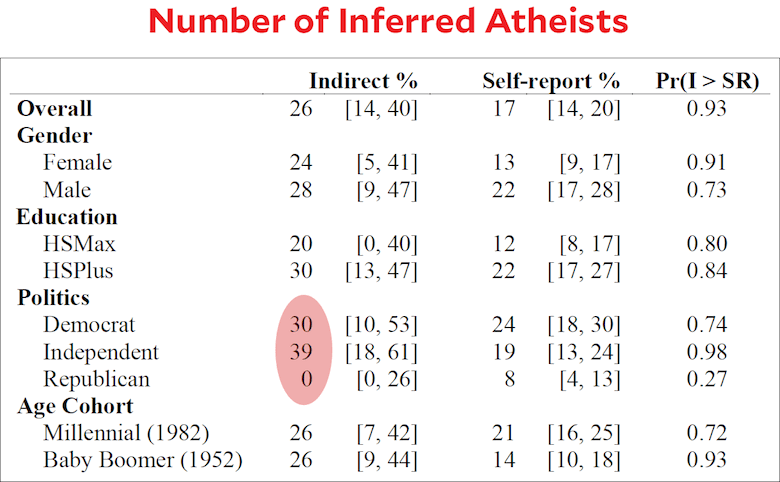While it is generally accepted that the number of nonbelievers in the US population is increasing, pinning down exact numbers and exactly what is implied by the word ‘nonbeliever’ is problematic because of the social pressures against identifying oneself as non-religious. What is easier to measure is the number of those who are unaffiliated with any religious institution, by not formally being members or attending services and the like.
There are periodic surveys by Pew and Gallup that try to measure the number of atheists in the population that Brian Resnick points to but the numbers they get may be underestimates because people in the US may not like to self-identify as such because of the negative connotations associated with the word. Resnick points to an interesting method by University of Kentucky psychologists Will Gervais and Maxine Najle in which survey respondents were able to keep their atheism secret and yet answer the question. (You can read the preprint of the paper here.) As Resnick describes it:
Pew and Gallup — two of the most reputable polling firms in America — both come to a similar figure. About 10 percent of Americans say they do not believe in God, and this figure has been slowly creeping up over the decades.
But maybe this isn’t the whole story. University of Kentucky psychologists Will Gervais and Maxine Najle have long suspected that a lot of atheists aren’t showing up in these polls. The reason: Even in our increasingly secular society, there’s still a lot of stigma around not believing in God. So when a stranger conducting a poll calls and asks the question, it may be uncomfortable for many to answer truthfully.
…They sent a nationally representative poll to 2,000 Americans, who were randomly assigned to two conditions.
The first condition asked participants to read through a bunch of statements like, “I am a vegetarian,” “I own a dog,” and, “I have a dishwasher in my kitchen.”
All the participants had to do was simply write down the number of statements that were true for them.
The value of this method is that participants don’t have to directly say, “I am a vegetarian,” or, “I’m a dog owner” — they only have to acknowledge the number of statements that apply to them. That alone should zero out any embarrassment or hesitance to admit to a particular item.
That’s important because the other 1,000 or so participants saw the exact same list — but with one statement added: “I believe in God.”
By subtracting the first score from the second, you could get the number of people who answered affirmatively to the last question without knowing who said yes or no. So what did they find?
One thing is clear from the results: Much more than 10 or 11 percent of the country (as assessed in Gallup and Pew polling) does not believe in God. “We can say with a 99 percent probability that it’s higher than [11 percent],” said Gervais.
His best estimate: Around 26 percent of Americans don’t believe in God. “According to our samples, about 1 in 3 atheists in our country don’t feel comfortable disclosing their lack of belief,” Najle explains in an email. [My emphasis-MS]
This is way higher than even the most optimistic atheists might have hoped.
Kevin Drum charts out the results disaggregated by various categories and points out a startling feature, that there seem to be no Republican atheists at all, or at least the number is consistent with zero within the margin of error.
The lack of Republican atheists is somewhat surprising but what was even more surprising to me is that there is no generational difference, countering the common idea that the younger generation has greater levels of disbelief than the older ones.


“countering the common idea that the younger generation has greater levels of disbelief than the older ones”
In the US it will soon be other way round -- thinking and expressing it has a lot to do with education as in “time and environment to learn to use your brain and talk about it without being penalized”.
In Europe the first Austerity wave of costcutting was the precursor for all this s h i t that fills corporate media now.
If I’m reading the chart correctly, the difference is that Baby Boomers are less willing to self-report their lack of god belief than Millennials. That would explain why earlier estimates (based on self-reporting) seemed to show higher nonbelief among those meddling kids.